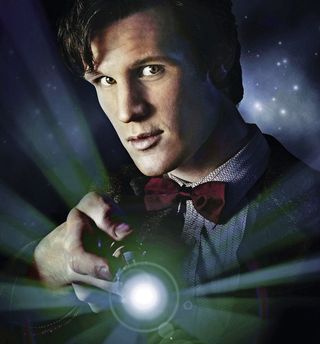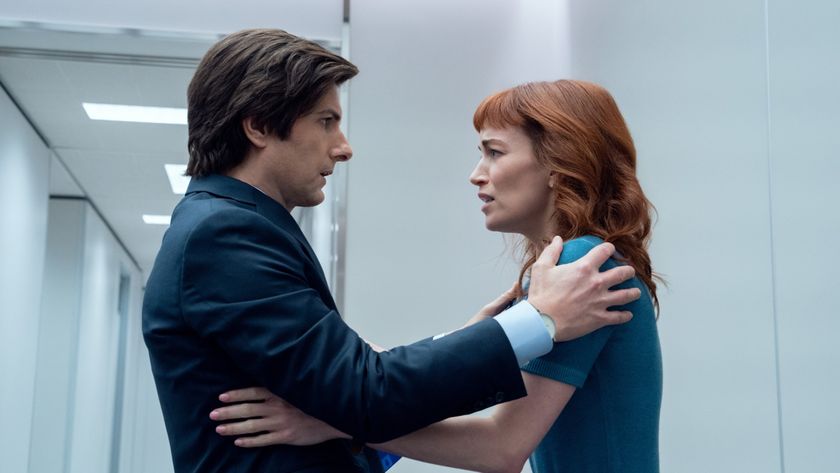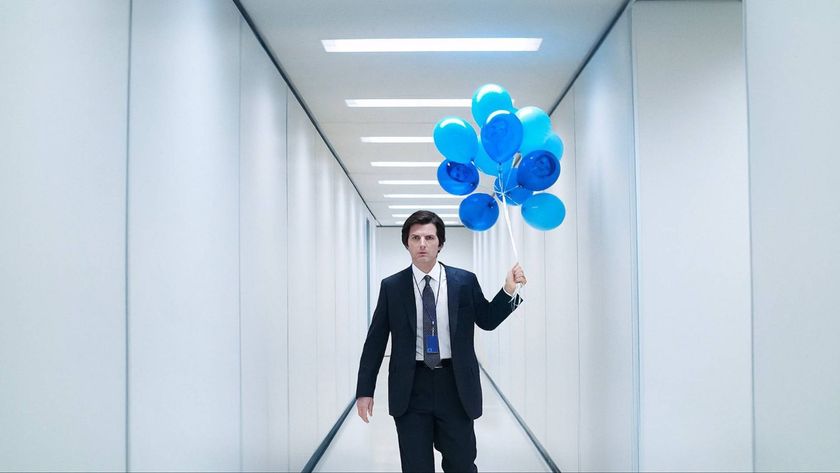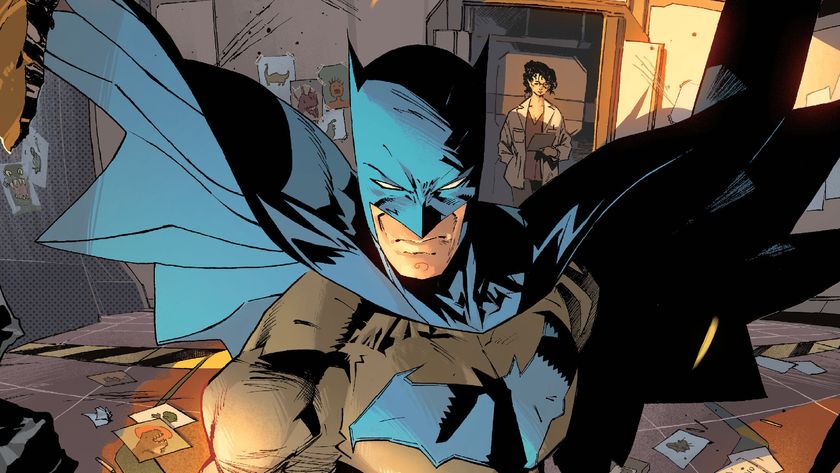GUEST BLOG Alastair Reynolds talks Doctor Who
Following the 50th anniversary of the good Doctor, top SF author Alastair Reynolds talks to SFX about his admiration for the show
Following the 50th anniversary of the good Doctor, top SF author Alastair Reynolds writes for SFX about his admiration for the show

Alastair Reynolds is a scientist and science fiction author, famous for, among many others, his Revelation Space series of novels. In 2009 he signed an unprecedented 10-year book deal with Gollancz worth a million pounds. This year he also wrote a Doctor Who novel, Harvest Of Time , and here he talks about his relationship with the show...
Doctor Who is part of my science fictional DNA. You could take it out of me and I’d probably still have ended up being a writer, but almost certainly not the same one. I also think it played a part in shaping my choice of career. Spock was a scientist, and – at least in the manner in which he was portrayed during my formative years – so was the Doctor. I came to the series in the early nineteen seventies, when Jon Pertwee’s Third Doctor seemed to spend half his time peering through microscopes in the UNIT laboratory. In addition to being staunch pacifists, Spock and the Doctor were both skeptical thinkers who would always look for the rational explanation at the heart of any given mystery – even if that "explanation" might involve barely comprehensible alien technologies and motives. There were no other strong scientific role models on television at the time, so I don’t think you can understate the importance of this iconic pair. They influenced not just my choice of work as a space scientist, but my entire outlook on life, the universe and everything. If I couldn’t be Spock or the Doctor, I could at least be a scientist. That didn’t strike me as a bad bargain.
My early memories of Who are clouded by time and confused by repeats and reissues. I have no direct recollection of the first two Doctors and none at all of the first season of the Pertwee era. By the last two seasons of the Third Doctor, I was properly hooked. The Daleks frightened me so much that I did not want to go round to the house of another boy because he had Dalek wallpaper on his bedroom, which struck me was profoundly wrong and troubling. Memorable stories include the two Peladon adventures, all of the Dalek encounters, "Carnival Of Monsters" and "Invasion Of The Dinosaurs". I can’t think of the latter without remembering a Saturday tea-time of sausages, mash potato and HP sauce.
I was a huge fan of Tom Baker but his tenure lasted such a long time that it also saw me falling slowly out of love with the programme. It was being clever when I wanted it to be scary, camp when I wanted it to take itself seriously. Nonetheless, some of the middle adventures of the Baker years had a significant effect on me. "Robots Of Death" is one of my all-time favourites and the wonderful design of the robots was an undeniable influence on my mental image of the character Doctor Trintrignant, from my stories "Diamond Dogs" and "Grafenwalder’s Bestiary". “Kill the Doctor!” was that week’s playground catchphrase. I think the whole look of that adventure is terrifically well-realised, from the costumes of the human protagonists to the marvellous Art Deco storm-mine machine. OK, it’s a flimsy plastic model but it looked pretty big and impressive on a small television screen in the 1970s.
I’ve also a huge affection for "The Talons Of Weng-Chiang", but then – who doesn’t? Yes, it’s wrong on all sorts of levels, but the ideas! Probably no coincidence that a human-pig hybrid also shows up in my Revelation Space universe.
I watched Who with a mixture of affection and exasperation through the eighties, always ready to cheer on the Doctor but seldom feeling that the series was playing to its strengths. Some of the adventures, revisited on DVD, turn out to be better than I remembered – others just as infuriating. But I never gave up hope that the series might find its way again. By the time of the Colin Baker/Sylvester McCoy years I was living away from home without a television, so I saw very few of them.
Sign up to the SFX Newsletter
Get sneak previews, exclusive competitions and details of special events each month!
The new iteration of Who is, in many ways, jarringly different from the old, for all the revisted monsters and clever nods to time-honoured continuity. But if the series had stayed on air throughout the '80s, I suppose it would have necessarily ended up being faster, glossier, more family-friendly, with better production values – much like the new stuff, in other words. Actually I like it a lot, with a few reservations. I think the new Doctors have all been excellent choices, and I’m sure Peter Capaldi will prove an equally fine addition to the role. Matt Smith has been one of my two or three favourite Doctors, period.

But I’m disappointed that the opportunity wasn’t taken to cast a black, asian, and/or female actor in the role. It’s no good saying the Doctor’s a man, and must therefore always remain a man. He’s a time-travelling, body-regenerating alien with two hearts and a respiratory bypass system, for pity’s sake. If a Zygon can become a horse, surely anything is possible? Spock and the Doctor were both men, but imagine if there’d been a strong female scientific role model on television in the 1960s and '70s? How would that have shaken things up?
I’m not actually that bothered about the "science fiction-ness" of Doctor Who . As Terry Pratchett has noted, the series is constructed on a much less secure conceptual foundation than Star Trek , and its ideas are often too rubbery to critique from a standpoint of scientific plausibility. If we can at least envisage something like the Enterprise, and speculate about how warp drive or transporters might function, the TARDIS constitutes a whole other order of conceptual unlikeliness.
But in that sense, the TARDIS is merely a perfect example of Arthur C Clarke’s dictum that any sufficiently advanced technology will be hard to distinguish from magic. One can apply the same thinking to a great deal of Who paraphernalia. Regenerations? Well, who knows who they work. But it almost certainly isn’t some sort of mystic reincarnation: it’s a physiological process that the Time Lords both invented and control, and which they can revoke when they wish. It may look like magic, but that doesn’t mean it actually is magic. And perhaps "sonic screwdriver" is just the Doctor’s slightly patronising shorthand for a gadget too hopelessly advanced for mere humans to comprehend, much as I might tell a caveman that my smartphone is a "magic talking bone".
Doctor Who might sometimes resemble a fairytale but the Doctor most certainly doesn’t believe in fairytales himself. The name "Doctor" cuts both ways. He’s a healer, but he’s also a scientist. I hope we never lose sight of that part of his character, because I think it matters rather a lot.
On The Steel Breeze , the latest book by Alastair Reynolds, is available now from Gollancz (£16.99 in hardback).
Most Popular








